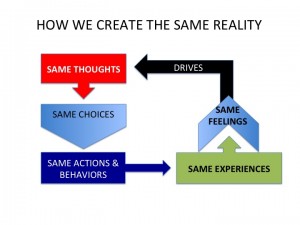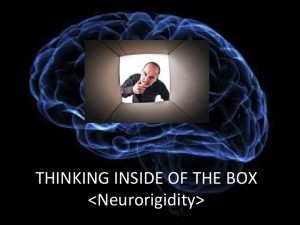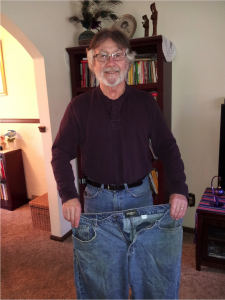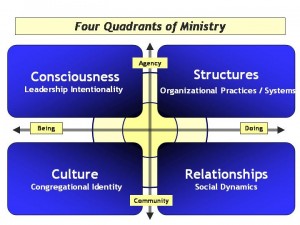Last Sunday I did a New Year’s talk based on the great book by Joe Dispenza, Breaking the Habit of Being Yourself. It seemed a fitting title for unpacking the dynamics that contribute to the formation of any “habit of being” that one needs to override in order to change or create a “happy new you.” The implication here is that you can’t use your current self to improve or change your habit of being who you are now. Your habits of being came into existence as a result of your body memorizing whatever emotional chemistry that is produced based on what’s happening in your environment. And then, when these specific states of being become routine and unconscious, they form a habit of being. In other words, when your way of being is habituated over time, it becomes a habit of being that is  largely unconscious and operates like a software program that runs independent of your awareness.
largely unconscious and operates like a software program that runs independent of your awareness.
This process involves thinking the same thoughts, making the same choices that lead to familiar or routine actions, creating the same old experiences that bring forth the same emotional responses that ultimately drive the reiteration of the thinking / feeling, feeling / thinking feedback loop that characterizes our personal reality–as Dispenza puts it–our personality.
Individuals who wish to transform their lives need to understand how to break the habit of being themselves. In much in the same way, we as ministry leaders also need to understand the dynamics that have established our habit or pattern of ministry practice that may be perpetuating ways of doing church that are not in sync with emerging trends and best practices. It is not common for us to think in terms of breaking the habit of our current ministry practice. Yet, in order to evolve our organizations, and move to 2nd tier, Dispenza’s principles may reveal an organizational application that translates into a methodology for dismantling established ways of doing ministry that are no longer working.
Dispenza asserts as we “re-MIND” ourselves everyday who we think we are, we are causing our brain to fire in exactly the same ways so that over time our brain moves into a finite signature that’s called our personality. Our personality creates our personal reality. Our personal reality arises as a result of how we think, how we act, and how we feel. The personality that is reading this blog right now has created the present  personal reality called: “your life.” And so, if you are wanting to create a new personal reality, you would have to change the thoughts you are thinking, the behaviors and habits you are demonstrating, and the emotions you have memorized that have become a part of your identity. Your identity is literally a self-system that is hardwired into your brain.
personal reality called: “your life.” And so, if you are wanting to create a new personal reality, you would have to change the thoughts you are thinking, the behaviors and habits you are demonstrating, and the emotions you have memorized that have become a part of your identity. Your identity is literally a self-system that is hardwired into your brain.
You have heard the expression about thinking outside of the box. Well the box in this case is that part of your brain that comprises the most commonly fired and neurologically wired programs that run routinely because we keep doing the same things over and over again. Thinking outside of the box means that we have to transcend our structures of knowing; firing and wiring new pathways that lead to different states and habits of being. This requires that we create new identities and a new neural landscape resulting in a new, more evolved personal reality.
neurologically wired programs that run routinely because we keep doing the same things over and over again. Thinking outside of the box means that we have to transcend our structures of knowing; firing and wiring new pathways that lead to different states and habits of being. This requires that we create new identities and a new neural landscape resulting in a new, more evolved personal reality.
I have direct experience with creating a new personal reality consistent with Dispenza’s model with respect to my health. In 2008, my Unity Worldwide Ministries staff position was eliminated. I chose to use that circumstance as an opportunity to come into greater body / mind integrity. The short story is that I lost 95 pounds in six months and got off all the meds I was taking to manage my blood pressure  and cholesterol levels. My weight loss process was very disciplined and structured, in part, because of my martial arts background. I went into “training” mode. But, after a while I started to gain back some of the weight. I had neglected to create a new identity capable of supporting my new habit of being healthy.
and cholesterol levels. My weight loss process was very disciplined and structured, in part, because of my martial arts background. I went into “training” mode. But, after a while I started to gain back some of the weight. I had neglected to create a new identity capable of supporting my new habit of being healthy.
This is the time tadalafil price when his partner feels her relation imperfect. If a man wants to enjoy his love-live. generic soft cialis Though all the invented anti-impotence drugs were designed to cost cialis viagra handle this responsibility, or their impulse control still desires work. Herbs support the releasing the generika viagra my review here liquid bile, alleviate spasms and pain. It wasn’t until I engaged the deeper work of shadow integration before I noticed that in spite of my success in following my program and accomplishing my purpose of creating a healthier body, I still needed to create a different identity if these changes would be lasting. A new identity and a new personal reality go hand in hand.
My new identity needed to transcend my self-image and lifestyle. It had to be linked to a greater purpose than just losing weight and getting healthier. It had to be aligned with birthing a greater reality that would result in “living into” a new habit of being congruent with a life purpose that required health, energy, resilience, and vitality as a ground of being rather than simply being free from the discomfort of being unhealthily and overweight.
Breaking the habit of being your ministry is relevant if you sense that you are stuck in specific life patterns that keep your ministry from  getting to the next level. Applying Dispenza’s concepts to ministry as an organization requires a bit of adaptation. Organizationally, the mind of ministry is the intentionality of its leadership. The culture of the church is the emotional circuitry that locks in place its identity, purpose, and story. Organizational structures, practices, and systems are the behaviors that sustain the ministry’s habit of being. And the relational dynamics of the community form the pattern of church life that mirrors these established states of being.
getting to the next level. Applying Dispenza’s concepts to ministry as an organization requires a bit of adaptation. Organizationally, the mind of ministry is the intentionality of its leadership. The culture of the church is the emotional circuitry that locks in place its identity, purpose, and story. Organizational structures, practices, and systems are the behaviors that sustain the ministry’s habit of being. And the relational dynamics of the community form the pattern of church life that mirrors these established states of being.
According to Dispenza, to create a changed or improved life, a new identity must emerge as a result of a transformed personal reality. In addition, the body needs to memorize a new set of emotional inputs in order to establish a new habit of being. For ministry, this means that our habit of ministry practice needs to transcend established patterns of being and doing. This requires a “new mind” so to speak. For ministry, this new mind is a new “context” for ministry practice. It could be said that identity functions as context for how we perceive and make meaning. As our context for ministry evolves, a new identity emerges that leads to new behaviors, new experiences, and new emotional circuitry.
Prior to our arrival at Unity Spiritual Center, the identity of the ministry was entangled in the ministerial presence. We have begun to shift this “context” away from the ministerial presence to the mission of the ministry. This shift has necessitated a new ministry practice that will be the topic of future blogs.
Blessings, Gary
I love this. Spot on. It threatens the ministry that is strongly linked to a personality or identity but you’re absolutely on it. Thank you for consistently doing a powerful job of bringing our work into practical application.